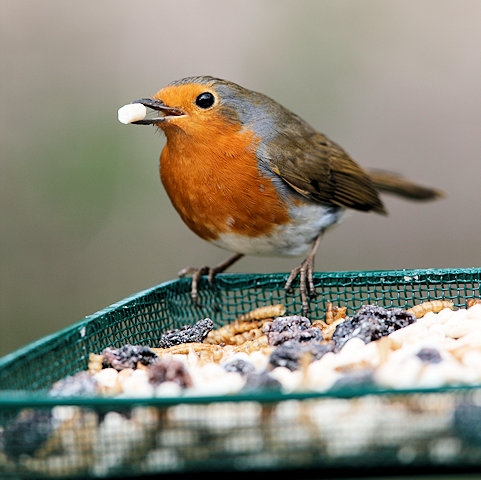Top tips to help garden birds stay in tip top condition
Date published: 26 November 2018

Photo: Nigel Blake (rspb-images.com)
Robin eating a mealworm and suet gourmet mix
As the cold weather advances, spare a thought for the garden birds which struggle to find food during this time of year.
After benefitting from a mild autumn, birds start to struggle during the winter months. The countryside becomes bare as natural resources dwindle, but more energy is needed just to keep warm and the short days leave less time to find something to eat. The nature charity says the key things that birds will need this winter are food, water and shelter.
Chris Collett from the RSPB in Northern England said: “Up until now birds have been able to feed on insects and seeds, but the cold weather means they move into our gardens to find refuge. You can make a real difference and improve their chances of survival, as well as being rewarded by great views of wildlife in your garden or outside space.”
Top tips to keeping your birds happy this winter
- Make it full fat: Birds need high-energy foods such as suet balls or cakes during the cold weather to maintain their fat reserves to survive the frosty nights. These are excellent winter foods and can be bought or homemade with lard or suet as a fun children’s activity.
- Top seed: Sunflower seeds are also high in fat – the oil content is higher in black than striped ones, and so they are much better. Sunflower hearts (the husked kernels) are a popular no-mess food.
- Small black nyjer seeds are a favourite of goldfinches and siskins, though you will need a special feeder as they are particularly small. Avoid bird food mixtures with large amounts of wheat, barley grains, split peas, beans, dried rice or lentils. These are added to some cheaper seed mixes to bulk them up but only attract the larger birds such as pigeons and doves. The better mixtures contain plenty of naked oats, sunflower seeds, and suet pieces.
- Save nature while shopping: Some bird foods contains palm oil so check with your shop or supplier. Keep an eye out for the ‘Fair to Nature’ label – any seeds which have this label are grown by farmers who put aside at least 10% of their land for wildlife conservation.
- Go nuts for peanuts: Siskins, tits and nuthatches love peanuts but make sure they’re fed from a stainless-steel mesh feeder. This will help stop squirrels and woodpeckers from destroying the feeder to get to the nuts! Peanuts can also contain a natural toxin which can kill birds so make sure you buy them from a reputable trader. Never give dry roasted or salted nuts.
- Spare some scraps: You don’t have to buy food in specially. Kitchen scraps like mild grated cheese, old fruit, cooked rice, unsalted bits of fat, roast potatoes and raw porridge oats will all be gratefully received. Dried fruits, such as raisins, sultanas and currants are particularly enjoyed by blackbirds, song thrushes and robins. Some dogs and cats can react badly to these fruits so please put them out of reach from these animals.
- No thank you! There are some foods you should avoid as they can be dangerous for birds. Cooking fat from the roast or Christmas turkey mixes with meat juices during cooking to make a runny, greasy mixture. This sticks to feathers and stops them from being waterproof. Others to avoid are dried coconut, cooked porridge oats, milk, and mouldy or salted food.
- Fresh is best: Another essential is fresh water for drinking and bathing. Finding sources of water can be hard with freezing temperatures, but there’s a simple trick which will help keep a patch of water ice-free. Float a small ball, such as a ping-pong ball, on the surface of the water and even a light breeze will stop it from freezing over.
- Warmth is key: Nestboxes are not just used over the summer egg-laying season – many birds will use them on a cold winter’s night. These boxes are frequently communal with many residents packing in together for extra warmth. The record number of birds found in one box is 63 wrens!
Ensuring your garden is filled with food now will improve your chances of having a successful Big Garden Birdwatch. The RSPB’s annual event runs from Saturday 26 to Monday 28 January 2019. To take part, all you need to do is spend one hour at any time over that weekend noting the number of feathered visitors to your garden or nearby park.
You can sign up for this year’s Big Garden Birdwatch from 12 December.
Do you have a story for us?
Let us know by emailing news@rochdaleonline.co.uk
All contact will be treated in confidence.
Most Viewed News Stories
- 1The plan for two new apartment blocks with an unusual car parking system
- 2Andy Burnham responds to harrowing reports from hospital nurses
- 3Police seize £48,000 in Rochdale property search
- 4The museum undergoing £8.5m transformation now needs a new roof
- 5Residents urged to be vigilant after spike in Shawclough burglaries
To contact the Rochdale Online news desk, email news@rochdaleonline.co.uk or visit our news submission page.
To get the latest news on your desktop or mobile, follow Rochdale Online on Twitter and Facebook.

